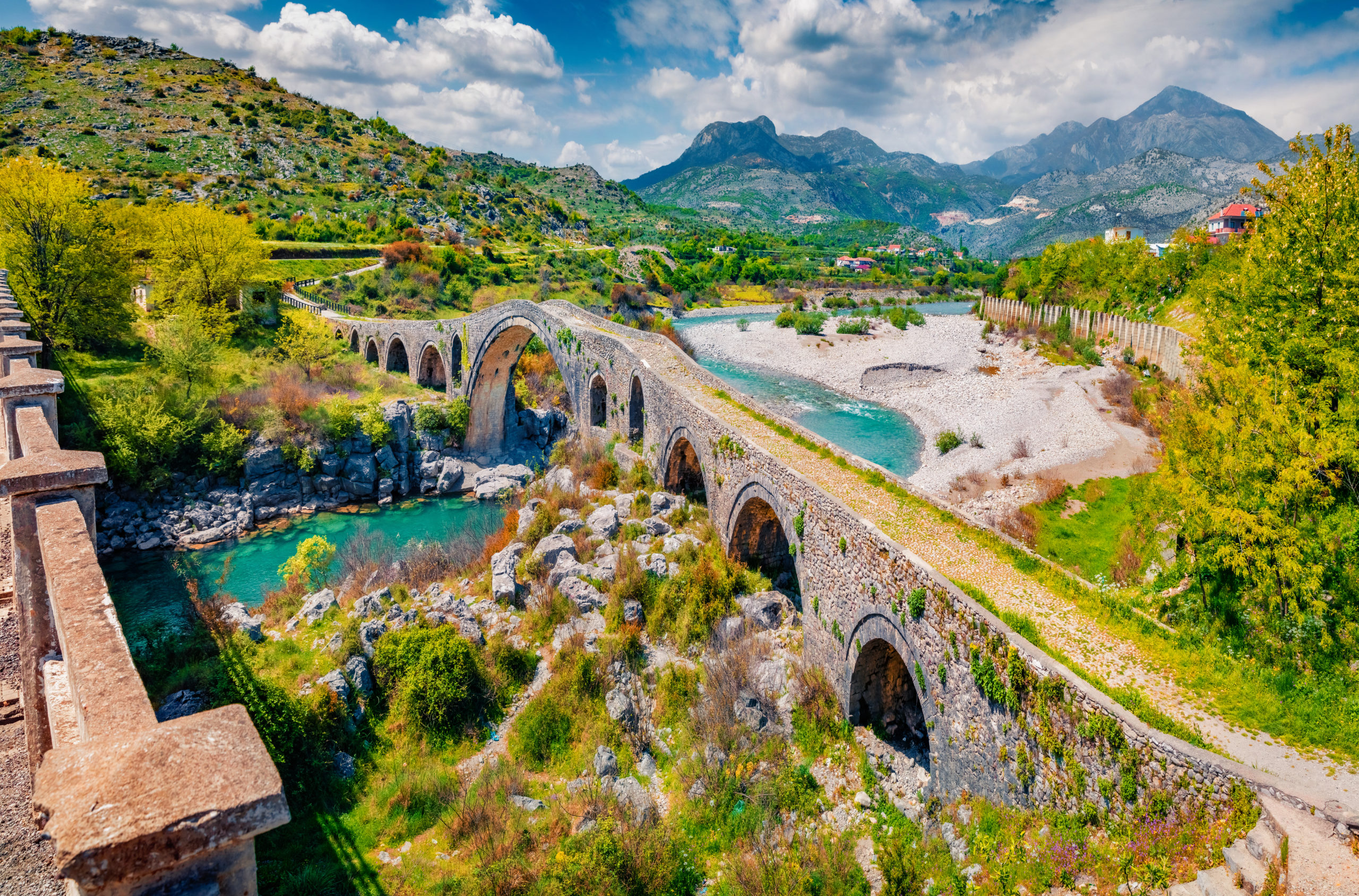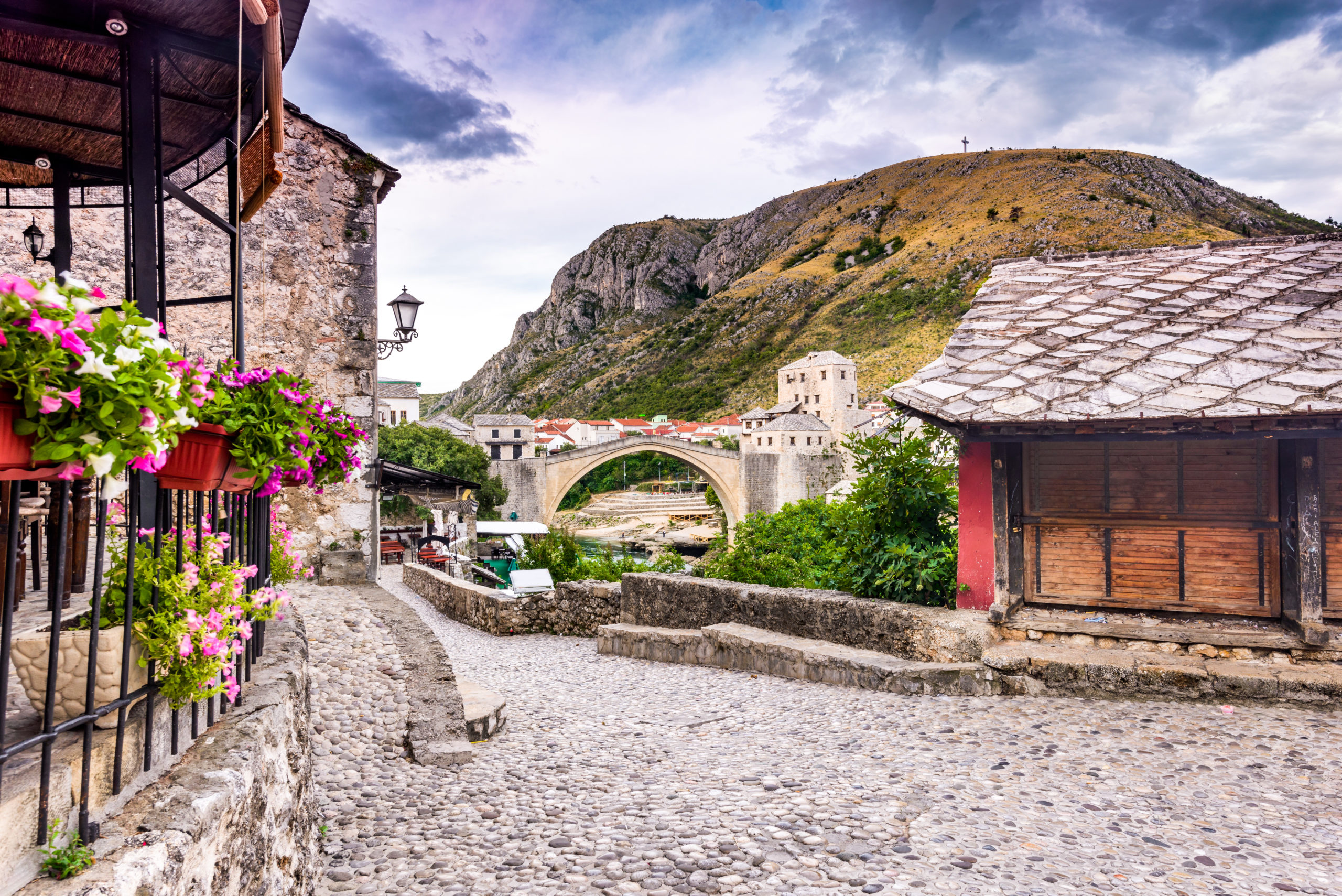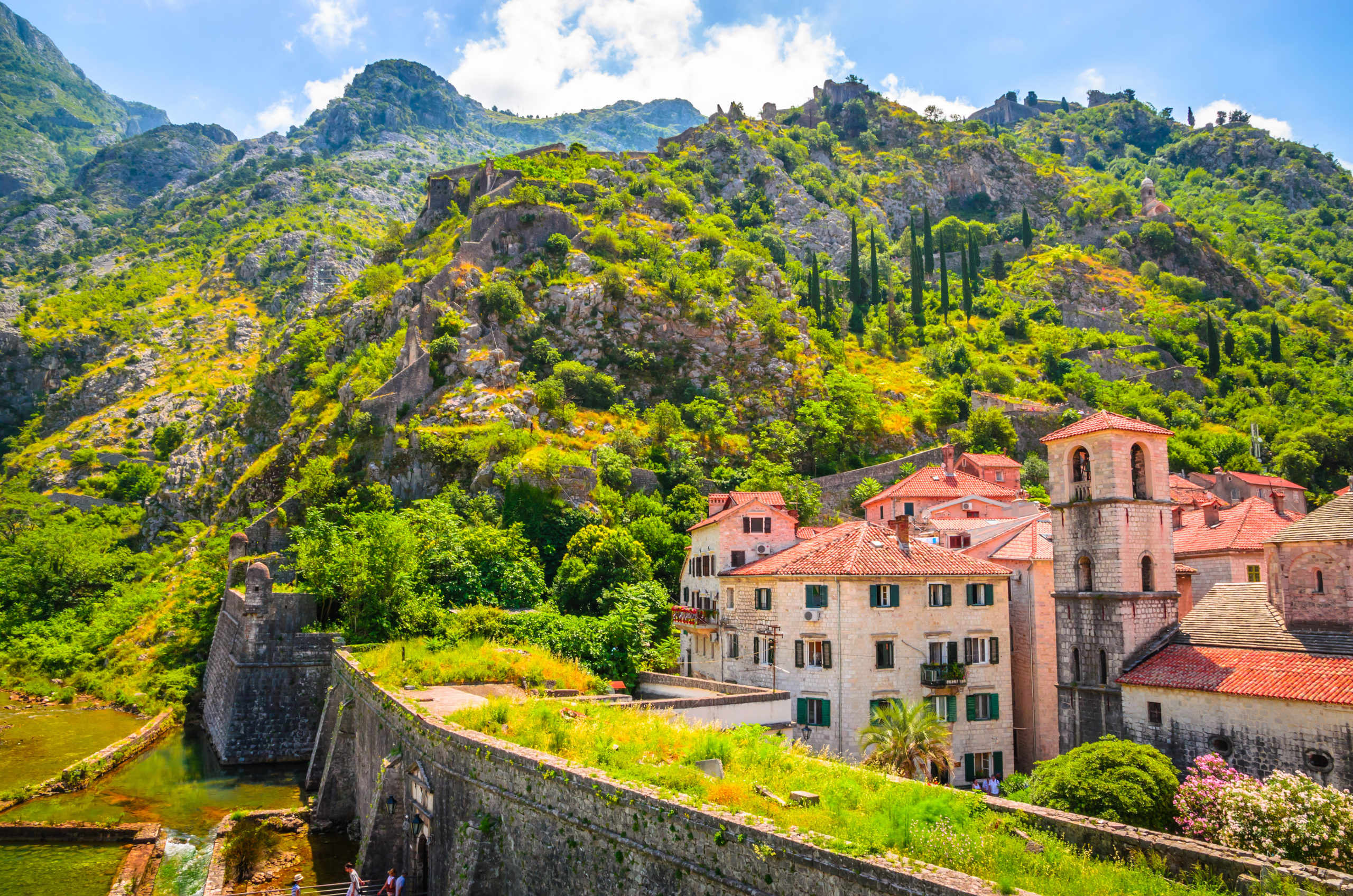Strategic Analysis Balkan Brief
First half of April
Petra Bošková, Chiara Mihalčatinová, Viktória Širocká, Lýdia Chobotová, Natália Lešňovská, Sára Gregová, Viktória Valová

Old Bridge in Albania. Photo: Shutterstock.com
Albania
IMO Slates Albania Judges’ Council’s Plans to Reinstate Fired Prosecutor
The International Monitoring Operation (IMO), appointed by the European Commission as part of Albania’s integration process, exhibits the authority to monitor the thoroughness of the judicial vetting procedures in Albania as part of the Justice Reform that started in 2016. The IMO comprises 15 members whose backgrounds include at least 15 years of experience working as judges or prosecutors in their home countries. The legislative framework gives these International Observers the authority to monitor the thoroughness of the vetting but also the freedom to voice their opinions and conclusions about each vetting procedure and submit inquiries during public hearings with the vetting organizations.
The IMO denounced a publicly unavailable plan of Albania’s High Council of Prosecutors to accept the request of a former prosecutor, Besnik Cani, to return to office after being fired by the vetting process. Cani was dismissed during the screening procedure by the Appeals College. The reason for his termination was, the Appeals College stated, his “atypical” business relationships with the Kastrati Group, one of the biggest businesses in Albania.
Cani was not the only prosecutor fired by the vetting process. While more than half of the Albanian legal system’s personnel was dismissed because of the screening procedures, others have resigned to avoid it.
After taking his case to the European Court of Human Rights (ECHR) in Strasbourg, Cani secured a partial victory. ECHR found that one of the members of the appeals body falsified documents which led to the conclusion that Cani’s screening procedure was flawed. However, the ECHR rejected his request for reinstatement, considering the type of misconduct uncovered in the vetting process.
The IMO emphasizes that all final screening judgments stay in effect until the point at which the case is reopened and evaluated by the appropriate court. Moreover, the Albanian Constitution explicitly recognizes the independence and exclusive jurisdiction of the vetting bodies. Thus, it is crucial to ensure that all state institutions and judicial authorities uphold these rights and refrain from acting in a way that directly conflicts with the results of the vetting judgments.‘
According to the IMO, Albania’s Council of Prosecutors’ decision to reinstate a fired former prosecutor would jeopardize the entire vetting procedure.
Sources:
- Gjergj Erebara, Balkan Insight, „IMO Slates Albania Judges’ Council’s Plans to Reinstate Fired Prosecutor“, https://balkaninsight.com/2023/04/03/internationals-slams-albanias-judges-council-plans-to-reinstall-fired-prosecutor/
- Delegation of the European Union in Albania “International Monitoring Operation, https://www.eeas.europa.eu/delegations/albania/international-monitoring-operation_en?s=214
Bosnia and Herzegovina
Is political deadlock a new reality in Bosnia and Herzegovina?
Although the general elections took place about six months ago, a new federal government has yet to be established at the Federation of Bosnia and Herzegovina (FBIH) entity level. And from what is happening in the country, politicians are still a long way from coming to an agreement.
According to the Constitution of the Federation, the members of government must be decided on by the parliamentary majority and signed by every member of the leadership of the FBIH. In the current circumstances, none of these mechanisms can be bypassed, which leads to situations like the current one with one of the vice presidents, Refik Lendo, refusing to give consent for the appointment. In fact, he will only sign if SDA, his political party, is given a role in the Federal government. However, this is unlikely to happen since the SDA has been left out of the governmental talks and side-lined by a newly created (potential) coalition.
On April 7, the legal deadline for the creation of the Federal government had passed, and BIH’s International envoy, Christian Schmidt, gave his last warning to politicians. During his public appearance, he stated: “Regardless of whom these concerns, this is a final call to come to their senses. I expect that this will be successfully resolved soon. There will be no additional final calls“. In other words, he is likely to intervene if nothing changes. This is happening despite the decision from October 2 when he imposed changes to the law to make it (supposedly) impossible for someone to block the formation of the Federal government in FBIH. From the current point of view, it is apparent that the decision did not yield the expected results.
The reason for current political gridlock can be found in the fact that Schmidt simply did not count on the likelihood that one coalition might hold a majority in the House of Representatives and the other in the House of Peoples. And since the House of People is responsible for proposing presidents and vice presidents, it forms a base on which the problem stands – two different coalitions unable to reach a consensus.
Sources:
- SarajevoTimes, ,,Time is running out for the Formation of the Federation of BiH Government”,https://sarajevotimes.com/time-is-running-out-for-the-formation-of-the-federation-of-bih-government/
- Azem Kurtic, ,,Bosnia’s International Envoy Gives ‘Last Warning’ to Federation Politicians“, https://balkaninsight.com/2023/04/07/bosnias-international-envoy-gives-last-warning-to-federation-politicians/
- SarajevoTimes, ,,FBiH Parliament today on the Appointment of the Government, Schmidt’s Deadline expires at Midnight“, https://sarajevotimes.com/fbih-parliament-today-on-the-appointment-of-the-government-schmidts-deadline-expires-at-midnight/

Mostar, Bosnia and Herzegovina. Photo: Shutterstock.com
Croatia
Montenegro Aims to Indict Croatian Citizens for Prison Camp Crimes
Podgorica aims to revise the country’s agreement with Croatia on the investigation of war crimes to charge Croatian citizens with commiting war crimes against Montenegrin soldiers held at a Croatian military prison camp. The current agreement between the two countries does not allow Montenegro to indict Croatian citizens who are accused of war crimes against Montenegrin citizens. In general, there is the continuing problem of impunity for war crimes committed during the 1991-1995 conflict in Croatia.
The agreement concerns war crimes committed against Montenegrins at the Lora military prison in the city of Split. In 1992, prisoners at the Lora military prison were held without any legal basis and were subjected to abuse, humiliation and torture. The prison camp was used to hold mostly Serbs who had been captured in Croatia or Bosnia and Herzegovina. The Lora prison originally belonged to the Yugoslav People’s Army but was taken over by the Croatian Army when war broke out in 1991.
The revision of the current agreement was brought up by parliament member Momo Koprivica. Koprivica belongs to the Democratic Montenegro party, which is part of the ruling coalition. The ruling alliance accused the former government led by Milo Djukanović’s Democratic Party of Socialists of signing an inadequate agreement with Croatia. The agreement allows Montenegro to indict Montenegrin citizens who are accused of committing war crimes by Croatia but are unavailable to the Croatian judiciary. However, on the other side, Podgorica cannot indict Croatian citizens who are accused of war crimes against Montenegrin citizens.
Sources:
- Samir Kajosevic, Balkan Insight, „Montenegro Seeks to Indict Croatians for Prison Camp Crimes“, https://balkaninsight.com/2023/04/11/montenegro-seeks-to-indict-croatians-for-prison-camp-crimes/
- Amnesty International, „A shadow on Croatia’s future: Continuing impunity for war crimes and crimes against humanity“ https://www.amnesty.org/en/wp-content/uploads/2021/09/eur640052004en.pdf
Kosovo
Hashim Thaci´s War Crimes Trial Opens
On Monday, April 3, Kosovo Specialist Chambers based in Hague opened a trial against former Kosovo PM and President Hashim Thaci and three other senior officers of the Kosovo Liberation Army (KLA), who are facing charges of war crimes and crimes against humanity, allegedly occurring between March 1998 and September 1999. Due to their seniority in the KLA, the prosecution is accusing them of being criminally responsible for 102 murders and the forced disappearance of 20 people committed by the KLA.
However, all four defendants plead not guilty and claim they cannot be considered criminally responsible for crimes of the KLA, as the army had a loose guerrilla structure, therefore, they allegedly had no control over the committed crimes. In his opening statement, Thaci expressed “remorse and pain for all the victims of this war, without prejudice” while maintaining his innocence by claiming “victims do not find justice when the innocents are prosecuted”, thus Thaci is expecting the court will acquit him, along with the other three co-defendants.
On the other hand, the prosecution claims they have documents confirming that KLA indeed had a hierarchical structure of the chain of command that was followed. During the war, “operational zones” were created, in which intelligence units were appointed and ordered to report information to KLA commanders, who in return informed the general intelligence unit, led by one of the defendants. Moreover, the prosecution plans to call on evidence from more than 300 witnesses.
Meanwhile, Kosovo Albanians expressed distrust with the court proceedings and demanded the acquittal of Thaci and the three others, both in Hague and Pristina. Protestors claimed the charges were unjust, purely political and aimed at diminishing Kosovo and its people. “Instead of bringing criminals here from Belgrade who committed terrible massacres in Kosovo, they have brought our liberators who fought in their [own] country,” said one of the protestors.
Sources:
- Xhorxhina Bami, Balkan Insight, “Kosovo Ex-President Thaci’s War Crimes Trial Opens in The Hague”,https://balkaninsight.com/2023/04/03/kosovo-ex-president-thacis-war-crimes-trial-opens-in-the-hague/
- Xhorxhina Bami, Balkan Insight, “Kosovo Guerrilla Leaders’ Orders Show War Crimes Guilt, Trial Told”, https://balkaninsight.com/2023/04/03/kosovo-guerrilla-leaders-orders-show-war-crimes-guilt-trial-told/

Kotor, Montenegro. Photo: Shutterstock.com
Montenegro
Montenegro’s longest-serving president Djukanovic loses the presidential election
Montenegro’s decades-long serving president, Milo Djukanovic, lost the presidential election race to a 36 years old ex-banker, Jakov Milatovic, who has pledged to root out corruption and organised crime present in the country on Sunday, April 2.
Leader of the Democratic Party of Socialists, Milo Djukanovic, was defeated in a presidential run-off after holding power for 32 years when he was first appointed Prime Minister in February 1991. Djukanovic lost the election by a large margin to a political newcomer, Europe Now candidate Jakov Milatovic who had the support of ruling majority parties.
In the first round of the elections, on March 19, Djukanovic won 35.7% while Milatovic won 28.9%. In the second round of voting, polls put Milatovic far ahead of Djukanovic Milatovic with about 60% of the vote. The turnout was higher than that of the 2018 presidential elections, with 70,07% of the eligible voters showing up.
Djukanovic reacted to the defeat in a respectful manner, saying: “Montenegro chose, and I respect that choice. I wish Milatovic to be a successful president and that Montenegro continues to be a successful country”. His party, the former ruling DPS, has been following a downward trend since the August 2020 parliamentary elections when it lost power to a coalition of three former opposition blocs. Moreover, DPS lost control of 10 out of 14 municipalities, including the capital, Podgorica, last October.
Civic activist Stefan Djukic and many other analysts said Milatovic’s victory showed that Montenegrins want to see new faces rule at the top. “The old authorities no longer attract the masses as they once did. Anyone who still wants to compete in the political spectrum needs to change if they want to survive,” he said. Therefore, it was very likely for the pro-European economist to appeal to a large number of voters desperate for change after decades of rule by Djukanovic. He also added that after the fall of Djukanovic, it’s hard to expect another party to have such strong control among the electorate, which definitely opens up a new way for new political elites.
The Europe Now movement emerged as a rising political star focusing on the economy and reforms last September when it managed to oust Djukanovic’s DPS party in the 2020 parliamentary elections.
Sources:
- Kajosevic, Samir, Balkan Insight, “Era Ends in Montenegro as Djukanovic Loses Presidential Election”, https://balkaninsight.com/2023/04/02/era-ends-in-montenegro-as-djukanovic-loses-presidential-election/
- Kajosevic, Samir, Balkan Insight, “Djukanovic’s Ousting Shows ‘Language of Division’ No Longer Works in Montenegro”, https://balkaninsight.com/2023/04/03/djukanovics-ousting-shows-language-of-division-no-longer-works-in-montenegro/
- Higgins, Andrew, New York Times, “Montenegro’s President, Europe’s Longest-Serving Elected Leader, Loses Run-off”, https://www.nytimes.com/2023/04/02/world/europe/milo-djukanovic-montenegro-election.html
North Macedonia
Working group on Constitutional changes and Bulgaria
At the beginning of March, the Government of North Macedonia announced the formation of a special commission composed of constitutional experts to work on constitutional changes related to the Bulgarian requirements. Meeting these requirements is needed to prevent further Bulgarian blockade of North Macedonia´s integrational process into the European Union. Bulgaria wants North Macedonia to include Bulgarians in its Constitution alongside all the other nations already listed. The situation regarding these changes is very complicated, and the government still has not found enough votes for the constitutional changes to be approved in the Parliament.
On April 5, Bulgarian Foreign Minister, Nikolay Milkov, said that Bulgaria would like to be part of the process of Macedonian constitutional changes. This statement has, of course, caused great suspicion in Skopje in already tense relations between these two countries.
Minister of Foreign Affairs Bujar Osmani, in his reaction to Milkov´s statement, said that “the process of constitutional change is an internal matter of the county, and there is neither the possibility nor the political will to involve citizens or institutions from abroad, including from the Republic of Bulgaria” President of North Macedonia, Stevo Pendarovski, also reacted: “Sofia´s request is scandalous”, and that “even occupiers do not send such request to other countries on territories that they have occupied. In the 21st century, a demand to interfere in the internal political or constitutional and legal process of any country is absurd and unprecedented”.
A few days later, Bulgaria’s Prime Minister, Galab Donev, again commented on the issue with a partial explanation of his minister´s statement: “Bulgaria does not want to interfere in North Macedonia´s internal affairs. (…) It is a misinterpretation that we wanted to participate in that process”.
The situation in North Macedonia over the constitutional changes is still very complicated because the issue is very polarising across the political spectrum, and the country appears to be in a deadlock.
Sources:
- Sinisa Jakov Marusis, Balkan Insight, “North Macedonia Slates ‘Scandalous’ Bulgarian Push for Role in Constitutional Change“, https://balkaninsight.com/2023/04/06/north-macedonia-slates-scandalous-bulgarian-push-for-role-in-constitutional-change/
- Nevenka Nikolik, Media Information Agency, “Donev: Bulgaria doesn’t want to interfere in North Macedonia’s internal affairs“, https://mia.mk/en/story/donev-bulgaria-doesnt-want-to-interfere-in-north-macedonias-internal-affairs

Belgrade, Serbia. Photo: Shutterstock.com
Serbia
Establishment of Serb-Majority Municipalities in Kosovo
The Association of Serb Majority municipalities in Kosovo has been one of the main obstacles in the dialogue between Belgrade and Prishtina for many years. This April, Serbia and Prishtina made progress on this issue and discussed the necessary steps for establishing the Association at a meeting in Brussels. The discussion was held as a part of the Belgrade-Prishtina dialogue process between the negotiators Petar Petkovic and Besnik Bislimi.
The discussion was preceded by a meeting between Kosovo Prime Minister Albin Kurti and Serbian President Aleksandar Vucic in March 2023. Both leaders agreed on an implementation plan for an agreement they reached to break the deadlock on the longstanding political dispute between the two countries. The establishment of the Association of Serb-Majority Municipalities is part of this EU-backed plan for the normalisation of ties.
The main issue with regard to the establishment of the Association is the dispute over its competencies. While Serbia insists that the Association must have executive powers, Kosovo insists on the formation of the Association without executive powers, thereby making it barely more than a non-governmental organisation.
Both Petkovic and Bislimi agreed that the meeting was very fruitful because, for the first time ever, the most concrete steps for forming the Association of Serbian Municipalities were discussed. The first step towards the formation of the Association is the presentation of the draft statute prepared by the management team within the framework of a high-level dialogue.
The creation of above mentioned Management team was a part of the 2013 Implementation Plan of the Agreement on the Normalisation of Relations between Belgrade and Prishtina, and it serves to help with the establishment of the Association. The Management should be composed of representatives from Kosovo’s four northern Serb-majority municipalities and established after approval by the Kosovo authorities.
Sources:
- Milica Stojanovic and Perparim Isufi, Balkan Insight, „Serbia, Kosovo Discuss Establishing Serb Municipalities Body“ https://balkaninsight.com/2023/04/05/serbia-kosovo-discuss-establishing-serb-municipalities-body/
- Sofija Popović, European Western Balkans, „Association of Serb Municipalities remains the main obstacle in Serbia-Kosovo dialogue“ https://europeanwesternbalkans.com/2023/02/17/association-of-serb-municipalities-remains-the-main-obstacle-in-serbia-kosovo-dialogue/

Contact us